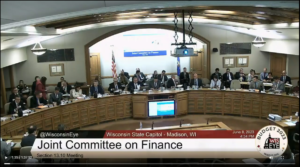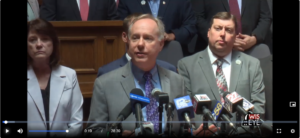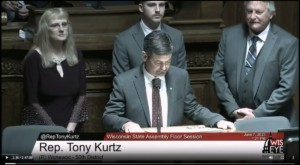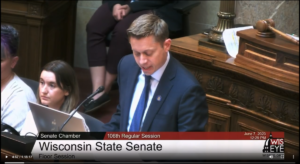
In this update:
- Budget Updates
- Legislative Updates
- Election Updates
- Events
- Fundraising Opportunities
Budget Updates
JFC holds exec session on Corrections, Justice, Safety and Professional Services, and Administration
On Thursday, the Joint Finance Committee held an executive session where it took action on the following sections of the budget: Corrections, Justice, Safety and Professional Services, and Administration. The committee had intended to take up Transportation as well, but dropped it from the agenda due to the lack of clarity on shared revenue at the time. Each section of the budget was passed along party lines with an 11-4 vote.
Corrections
JFC approved a $15.3 million per year annual increase for overtime pay for correctional officers at DOC. JFC co-chair Rep. Mark Born noted that the budget adopted by JFC on Thursday did not include pay raises since that would be addressed at a different phase of the budget drafting process when wages for state employees are approved.
Justice
Although Gov. Tony Evers had requested a $92 million increase in GPR funding for DOJ, JFC Republicans chose to boost GPR funding by $10 million. The budget approved by JFC adds three state crime lab employees for handling toxicology and DNA testing, but does not add any additional funds to the Office of School Safety. AG Kaul opposed the decision to forego additional funding for the Office of School Safety, saying “Without prompt legislative action to remedy this issue, core services that office has provided — including the 24/7 tip line that has received thousands of contacts — will end.” Republican JFC members have not publicly commented on their funding decision for the office.
Safety and Professional Services
JFC Republicans approved a $22 million increase in funding for DSPS, including funding for 17.75 new positions and $4.4 million to upgrade the agency’s license processing software. 13 of the new positions approved by JFC would be 2 or 4-year project positions in license processing and call center staffing, and not permanent jobs. In contrast, Democrats had requested boosting funding by $35 million which would have covered 40 additional positions, including 16 additional employees to handling license processing. Republicans argued the new processing software and upcoming DSPS audit would yield efficiencies at the agency so the additional positions would not be needed. Democrats countered the GOP would “own any issues [going] forward” with DSPS licensing backlogs since they were unwilling to adequately fund the agency.
Administration
The GOP motion approved along party lines by JFC dedicated $920,00 in GPR funding for the Walter Schroeder Aquatic Center and $200,000 in GPR funding for the Madeline Island Ferry. The motion also included $3 million annually for the District Attorney Information Technology (DAIT) program, as well as $1.4 million in one-time funding to pay for IT upgrades at DA offices across the state.
LFB releases remaining budget papers
The Legislative Fiscal Bureau has released the remaining budget papers that will be considered by JFC in executive session. Please use the links below to access the corresponding budget paper.
Children and Families — Child Support and Departmentwide
- 280 – Local Child Support Enforcement
- 281 – Child Support IT Modernization Project
- 282 – Cybersecurity
Children and Families — Child Welfare
- 265 – Domestic Abuse Services
- 266 – Kinship Care and Foster Care
- 267 – Services and Operation of the Division of Milwaukee Child Protective Services
- 268 – Tribal Subsidized Guardianships
- 269 – Home Visiting
- 270 – eWiSACWIS System Enhancement, Youth Justice Data Systems, and Youth Assessment Screening Instrument
Children and Families — TANF and Economic Support
- 250 – Estimates for TANF-Related Programs under Current Law
- 251 – Wisconsin Shares Child Care Subsidy Program
- 252 – Child Care Partnership Program
- 253 – Quality Care for Quality Kids — Child Care Quality Improvement Program
- 254 – Child Care Quality and Availablity Initiatives
- 255 – Grant Programs
- 256 – Caretaker Supplement
General Fund Taxes — Excise Taxes and Other Taxes
General Fund Taxes — Income and Franchise Taxes
- 360 – IRC Update – Federal Legislation Enacted in 2021 and 2022
- 361 – Federalize Tax Treatment of Tax-Advantaged Savings Plans
- 362 – Expand Child and Dependent Care Credit
- 363 – Income Tax Provisions Affected by Inflation
- 364 – Expand Retirement Income Exclusion
- 365 – Withholding Table Adjustments
- 366 – Overview of Broad-Based Income and Franchise Tax Reductions
General Fund Taxes — Refundable Tax Credits and Other Payments
Health Services — Behavioral Health
- 445 – Crisis Urgent Care and Observation Facilities
- 446 – Suicide and Crisis Lifeline Grants
- 447 – Psychiatric Residential Treatment Facility Certification and Grant Program
- 448 – Mental Health Consultation Program
Health Services — Care and Treatment Facilities
- 455 – Facility Food and Variabile Nonfood Supplies and Services
- 456 – Overtime Supplement
- 457 – Mendota Juvenile Treatment Center — Staffing and Funding for Expansion Staffing
- 458 – Expand Northern Wisconsin Center’s Intensive Treatment Program
- 459 – Contracted Community Services
Health Services — FoodShare and Public Assistance Administration
- 465 – FoodShare Employment and Training Program
- 466 – MA and FoodShare Administration — Contracts
- 467 – Income Maintenance — Local Assistance
Health Services — Medical Assistance — Eligibility and Benefits
- 405 – Medical Assistance Cost-to-Continue Estimate
- 406 – Postpartum Eligibility Extension
- 407 – Medical Assistance Provider Reimbursement Rates
- 408 – Community Support Program
- 409 – Residential Substance Use Disorder Treatment Room and Board Funding
- 410 – SeniorCare Reestimate
Health Services — Medical Assistance — Long-Term Care
- 420 – Medical Assistance — Long-Term Care
- 421 – Home and Community-Based Services
- 422 – Nursing Home Personal Needs Allowance
Health Services — Public Health
- 435 – Personal Protective Equipment Stockpile
- 436 – Newborn Screening Program
- 437 – Mike Johnson Life Care HIV_AIDS Services
- 438 – Suicide Prevention Coordinator
- 439 – Free and Charitable Clinics
Health Services — Quality Assurance
- 460 – Health Care Provider Innovation Grants
- 461 – Bureau of Assisted Living Staffing
- 462 – Office of Caregiver Quality
Health Services — Services for the Elderly and People with Disabilities
- 425 – Aging and Disability Resource Centers
- 426 – Complex Patient Pilot Program
- 427 – Adult Protective Services System
- 428 – WisCaregiver Careers
- 429 – Office for the Promotion of Independent Living Programs
- 430 – Alzheimer’s Family and Caregiver Support Program, Alzheimer’s Training and Information Grants, and Lifespan Respite Care Grants
Public Instruction — Administration and Other Funding
- 655 – Mental Health Training Programs
- 656 – Academic and Career Planning
- 657 – Grants to Nonprofit Organizations
- 658 – Public Library System Aids
- 659 – Online Early Learning Program
Public Instruction — Categorical Aids
- 635 – Special Education Aids
- 636 – School Breakfast Programs
- 637 – Bilingual-Bicultural Aid
- 638 – Early Literacy and Reading Improvement
- 639 – High Cost Transportation Aid
- 640 – Driver Education Aid
Public Instruction — General School Aids and Revenue Limits
Shared Revenue and Tax Relief — Direct Aid Payments
- 710 – Supplemental County and Municipal Aid — Lac Courte Orilles Federal Court Decision
- 711 – Eliminate Computer Aid Payment Delay
- 712 – Payments for Municipal Services Program
University of Wisconsin System
- 810 – UW System General Program Operations
- 811 – Health Care Provider Loan Assistance Program
- 812 – Missing in Action Recovery and Identification Project
- 813 – UW-River Falls Farm and Industry Short Course
- 814 – UW Stevens Point Institute for Sustainable Technology
- 815 – Freshwater Collaborative Positions
University of Wisconsin System — State Laboratory of Hygiene
- 816 – State Laboratory of Hygiene Structural Deficit Newborn Screening, Forensic Toxicology, and Rent
- 817 – State Laboratory of Hygiene — Soil Health and Cyanobacterial Blooms Monitoring
University of Wisconsin System — Veterinary Diagnostic Laboratory
Wisconsin Housing and Economic Development Authority
- 855 – Wisconsin Housing Rehabilitation Loan Program
- 856 – State Low-Income Housing Tax Credit Increase
- 857 – Increase Capital Reserve Fund Bonding Authorization
Update on JFC’s 2023-2025 budget deliberations
See the below graphics showing JFC’s progress on its budget deliberations for the 2023-25 state budget. The first graphic shows the items that already have been addressed by JFC. The second graphic shows the items that still need to be addressed by JFC.
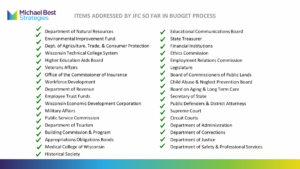
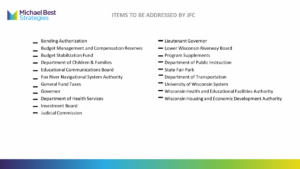
Legislative Updates
Reading reform addressed in new Assembly bill
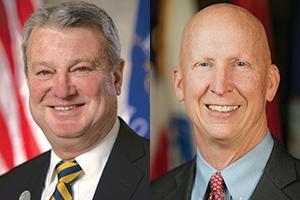 Senator Duey Stroebel (R-Cedarburg) and Representative Joel Kitchens (R-Sturgeon Bay) have circulated for co-sponsorship the “Right to Read Act” which would establish the Office of Literacy in the Department of Public Instruction and contract 64 full-time literacy coaches who would help teachers implement the science of reading, a literacy model structured around phonological awareness, phonemic awareness, phonics, building background knowledge, oral language development, vocabulary building, instruction in writing, instruction in comprehension, and reading fluency. The bill’s authors said they have been working with Governor Tony Evers and the Department of Public Instruction to craft a bill that will be supported by both sides of the aisle. However, Jill Underly, the Superintendent of Public Instruction, said she did not receive the final bill draft before its introduction, and does not support it due to the retention policy. The retention policy would require third graders who score in the lowest proficiency category on their reading assessment to be held back from advancing to fourth grade and require those held back to go through “an intensive summer reading program” starting September 1, 2028. “We are supportive of a literacy bill, but this version of the bill includes a retention policy requirement, and that is a non-starter for us because, as drafted, it is harmful to our learners, families, and communities,” Superintendent Underly said. Rep. Kitchens said he’s willing to negotiate on the retention policy issue, “but I think once they realize what that is they’ll come around, but overwhelmingly, I’ve gotten a great response.”
Senator Duey Stroebel (R-Cedarburg) and Representative Joel Kitchens (R-Sturgeon Bay) have circulated for co-sponsorship the “Right to Read Act” which would establish the Office of Literacy in the Department of Public Instruction and contract 64 full-time literacy coaches who would help teachers implement the science of reading, a literacy model structured around phonological awareness, phonemic awareness, phonics, building background knowledge, oral language development, vocabulary building, instruction in writing, instruction in comprehension, and reading fluency. The bill’s authors said they have been working with Governor Tony Evers and the Department of Public Instruction to craft a bill that will be supported by both sides of the aisle. However, Jill Underly, the Superintendent of Public Instruction, said she did not receive the final bill draft before its introduction, and does not support it due to the retention policy. The retention policy would require third graders who score in the lowest proficiency category on their reading assessment to be held back from advancing to fourth grade and require those held back to go through “an intensive summer reading program” starting September 1, 2028. “We are supportive of a literacy bill, but this version of the bill includes a retention policy requirement, and that is a non-starter for us because, as drafted, it is harmful to our learners, families, and communities,” Superintendent Underly said. Rep. Kitchens said he’s willing to negotiate on the retention policy issue, “but I think once they realize what that is they’ll come around, but overwhelmingly, I’ve gotten a great response.”
In the cosponsorship memo, the bill’s authors say the plan is “modeled after the ‘Mississippi Miracle’” and will spot struggling readers sooner, create an intervention plan for each student, change the way the state teaches reading, train new and current teachers in the science of reading, provide coaching assistance for schools, allow parents and taxpayers to see how schools are progressing in reading scores, and develop model retention policies for school districts.” It also shared statistics about Wisconsin’s high percentage of students not reading proficiently, and why the Mississippi model will likely improve this.
State leaders strike tentative deal on shared revenue
Gov. Tony Evers and Republican legislative leaders announced Thursday a tentative deal had been struck on shared revenue. Gov. Evers made the announcement via press release while Assembly Speaker Robin Vos and Senate Majority Leader Devin LeMahieu held a press conference with fellow GOP lawmakers to announce the news. “This compromise will be transformative for our communities and our state, and coming to an agreement in principle on major parts of this proposal is a significant milestone in my negotiations with Republican leaders over the past few months,” Gov. Evers said. Similarly, Majority Leader LeMahieu also praised the deal. “When these bills become law, every local government and school in the state will see a significant increase in available resources,” said Sen. LeMahieu. “Wisconsinites will benefit from better roads, increased school funding and enhanced public safety – including required investments from local governments in police, fire and EMS.”
When asked whether Republicans would have the votes to pass the deal without the referendum requirement, Speaker Vos and Sen. LeMahieu both said they were confident they would get the votes needed. “Sometimes the offer and the opportunity to get wins for things you believe in are so good, you have to change your mind,” said Speaker Vos referring to GOP priorities included in the deal such as increased funding for public safety and charter schools, as well as the prohibition on spending tax dollars on diversity and equity initiatives and The Hop street car.
Democratic legislative leadership including Assembly Minority Leader Greta Neubauer and Senate Minority Leader Melissa Agard also put out a joint press release acknowledging a deal had been reached and promising to continue working on supporting Wisconsin’s local communities. “Every community in Wisconsin is impacted differently by this proposal. For some, this is progress, for others, it doesn’t cut the mustard. What we know for sure is that our work is not complete — we must continue to pursue legislation that empowers local governments and creates communities where people want to grow, live, and work.”
Key changes to the shared revenue deal include:
- Increasing the minimum shared revenue payment for counties and municipalities to 20%, although the new floor would still not apply to Madison or Milwaukee;
- Allowing the city and county of Milwaukee to increase sales taxes by 2% and 0.4%, respectively, if approved by a 2/3 majority of the city council and county board;
Also announced as part of the shared revenue deal was a separate agreement on education between Gov. Evers, Speaker Vos, and Majority Leader LeMahieu that includes:
- Over $1 billion in new money for K-12 education, including a $325 per pupil increase in each fiscal year on revenue limits;
- $50 million to improve reading and literacy outcomes for K-12 students with details on how the money will be spent still to be determined;
- $30 million in additional funding for school-based mental health services;
- $97 million in additional funding for special education;
- $285 million to increase per pupil aid for choice and independent charter schools;
- Increasing the low revenue ceiling from $10,000 to $11,000 per student.
Read MBS’ full memo on the shared revenue deal: click here
Lawmakers looking at new Brewers proposal
 A bipartisan group of lawmakers is looking at a new proposal to ensure the Milwaukee Brewers remain in Wisconsin. Instead of providing the team a lump sum payment like Governor Evers proposed, the new proposal would provide the team with annual payments for the next 27 years, when their new lease is likely to end. As part of the new proposal, the lawmakers are considering partially funding the payments through income tax revenue from the professional baseball players, instead of fully from the state surplus like Governor Evers had proposed. On this proposal, Senate Majority Leader LeMahieu stated, “If we’re going to make steady payments to keep them here until 2050 or whatever the lease amount period ends up being, just paying for it over the long run when salaries continue to rise, that works as well.” He also noted that any legislation regarding the Milwaukee Brewers will likely need bipartisan support to pass.
A bipartisan group of lawmakers is looking at a new proposal to ensure the Milwaukee Brewers remain in Wisconsin. Instead of providing the team a lump sum payment like Governor Evers proposed, the new proposal would provide the team with annual payments for the next 27 years, when their new lease is likely to end. As part of the new proposal, the lawmakers are considering partially funding the payments through income tax revenue from the professional baseball players, instead of fully from the state surplus like Governor Evers had proposed. On this proposal, Senate Majority Leader LeMahieu stated, “If we’re going to make steady payments to keep them here until 2050 or whatever the lease amount period ends up being, just paying for it over the long run when salaries continue to rise, that works as well.” He also noted that any legislation regarding the Milwaukee Brewers will likely need bipartisan support to pass.
Assembly holds floor session
On Wednesday, the Assembly held a floor session where they voted on 14 bills and 4 resolutions. Notably, they passed a package of seven bills that Republicans say will update the Department of Safety and Professional Services’ credentialing process. The bills would require DSPS to report information about how many applications it has received and processed, as well as expanding license renewal periods for health and business professions. Democrats mostly opposed the measures, saying if the legislature wants to increase DSPS’ workload it should also allow the department to use its fee revenue to hire additional staff.
By voice vote, the Assembly also passed a bill to increase the penalty for contributing to a person’s death from consuming certain illicit drugs to a maximum of 60 years in prison. Representative Dittrich (R) said it’s a very emotional issue for her, calling it “tremendously personal.” “Believe it or not, folks, sometimes being behind bars still has the scared-straight effect in our communities. I will tell you, it did in my family. Jail time and Huber time was enough to force my loved one to get her act together, to get care, to get better, to go back to school, get a degree, get job,” she said. Alternatively, Representative Clancy (D) argued there’s no evidence that suggests adding more years onto a sentence helps reduce drug problems. “I urge us not to focus on symbolic action that does more harm to our communities and instead develop solutions that we know will work,” he said.
The Assembly also passed a bill that will require all high school students to take one half-credit of financial literacy to graduate, with only Rep. Clancy voting against it. The Assembly has another floor session scheduled for next Wednesday, June 14th, where they will vote on the following bills:
- AB-039: Housing Tax Credit – Changes to the low-income housing tax credit.
- AB-096: Tax Incremental Districts – Developer-financed tax incremental districts.
- AB-264: Housing Loan Fund – Residential housing infrastructure revolving loan fund and revolving loan program.
- AB-265: Housing Rehabilitation Loans – A main street housing rehabilitation revolving loan fund and loan program.
- AB-266: Land Development Review – Judicial review of local governmental decisions related to certain land development, local approval of residential housing development, and amendment of zoning ordinances.
- AB-267: Housing Rehab Loans – Housing rehabilitation loans awarded by the Wisconsin Housing and Economic Development Authority.
- AB-268: Housing Loan Fund – Commercial-to-housing conversion revolving loan fund and loan program.
Senate holds floor session
The Senate held a floor session Wednesday where it passed 26 bills, including a package of 5 bills passed along party lines that would make changes to the state’s unemployment program. Similar bills addressing the unemployment program were passed last session, but were vetoed by Gov. Tony Evers. Senate Minority Leader Melissa Agard (D-Madison) signaled the 5 GOP bills passed this week would also be vetoed by the governor. “This is a cynical distraction from the work we should be doing. But thankfully they won’t become law,” Sen. Agard said.
The Senate also referred to committee a bill that would uphold a JCRAR objection to a DHS rule that would have required seventh graders to be vaccinated against meningitis and for high school seniors to receive a booster. For the rule to be permanently suspended, the legislature would have to pass and the governor would have to sign a bill into law. Since Gov. Evers would likely veto any bill overturning the DHS rule, Republicans instead chose to send the bill to committee where the objection will be upheld until the end of the legislative session in April 2024.
Other notable bills passed by the Senate during its floor session Wednesday include:
- AB 47: Requires the parole commission to publicly post the names of inmates paroled from prison, as well as those whose parole has been revoked. The bill also requires the commission to post monthly reports on the number of inmates granted parole, the number denied release, and the number who are sent back to prison after their parole is revoked. The Senate passed an amendment to the bill, so the amended version will need to go back to the Assembly for approval before going to the governor for signature.
- AB 141 and AB 142: Would bar state and local government from restricting the sale or use of gas-powered equipment such as lawnmowers or snowblowers, as well as gas-powered vehicles. Both bills now head to the governor’s desk for approval or veto.
Amundson recommended for confirmation by Senate committee
 On Tuesday, members of the Senate Committee on Mental Health, Substance Abuse Prevention, Children and Families held an executive session where they voted unanimously to approve Emilie Amundson as Secretary of the Department of Children and Families. Secretary Amundson was first appointed by Governor Evers in January 2019, and confirmed 32-1 by the Senate in February 2020, with only Senator Lena Taylor (D) voting no. Secretary Amundson received her undergraduate degree from UW-Madison, her Master of Education Policy from Harvard Graduate School of Education and has completed coursework toward a Ph.D. in Literacy Studies at UW-Madison. Her confirmation will now be voted on by the Senate.
On Tuesday, members of the Senate Committee on Mental Health, Substance Abuse Prevention, Children and Families held an executive session where they voted unanimously to approve Emilie Amundson as Secretary of the Department of Children and Families. Secretary Amundson was first appointed by Governor Evers in January 2019, and confirmed 32-1 by the Senate in February 2020, with only Senator Lena Taylor (D) voting no. Secretary Amundson received her undergraduate degree from UW-Madison, her Master of Education Policy from Harvard Graduate School of Education and has completed coursework toward a Ph.D. in Literacy Studies at UW-Madison. Her confirmation will now be voted on by the Senate.
Election Updates
First RNC debate to be August 23 in Milwaukee
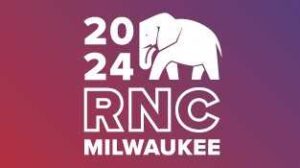
The Republican National Committee announced that the first Presidential debate will be held on August 23rd in Milwaukee. The release also noted the criteria to qualify for the debate, which includes the following;
- Have a minimum of 40,000 unique donors to candidate’s principal presidential campaign committee (or exploratory committee), with at least 200 unique donors per state or territory in 20+ states and/or territories.
- Poll at least 1% in three national polls OR 1% in two national polls and 1% in one early state poll from two separate “carve out” states (Iowa, New Hampshire, Nevada, South Carolina) recognized by the RNC.
- Have signed pledge agreeing not to participate in any non-RNC sanctioned debate for the remainder of the election cycle.
- Have signed pledge agreeing to support the eventual party nominee.
RNC Chairwoman Ronna McDaniel stated, “I am excited to announce the criteria for our first presidential primary debate in Milwaukee on August 23. The RNC is committed to putting on a fair, neutral, and transparent primary process and the qualifying criteria set forth will put our party and eventual nominee in the best position to take back the White House come November 2024.”
Events
DHS budget update recap
 On Wednesday, we hosted a budget update with the Department of Health Services (DHS) executive leadership team— Sarah Valencia, Assistant Deputy Secretary; HJ Waukau, Legislative Director; and Angela Miller, Policy Director. The update from the team covered the Department’s state budget request, mental health, the workforce, the pandemic, Medicaid, and more. We will be hosting a second DHS briefing/meet & greet in the coming weeks with Secretary-designee Kirsten Johnson.
On Wednesday, we hosted a budget update with the Department of Health Services (DHS) executive leadership team— Sarah Valencia, Assistant Deputy Secretary; HJ Waukau, Legislative Director; and Angela Miller, Policy Director. The update from the team covered the Department’s state budget request, mental health, the workforce, the pandemic, Medicaid, and more. We will be hosting a second DHS briefing/meet & greet in the coming weeks with Secretary-designee Kirsten Johnson.
We thank all clients who attended in-person and virtually for their participation and great questions!
To find out more about what was discussed at the event, read our memo: click here
Fundraising Opportunities
A list of all upcoming fundraiser opportunities can be found by clicking the button below. For any questions or more information, please do not hesitate to contact your Michael Best Strategies contact.


